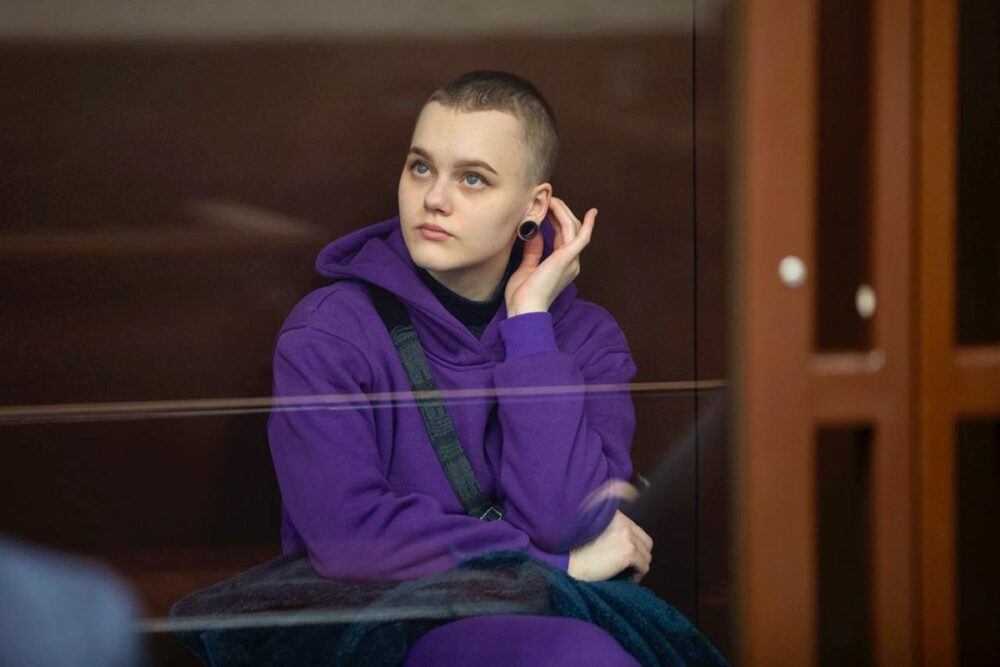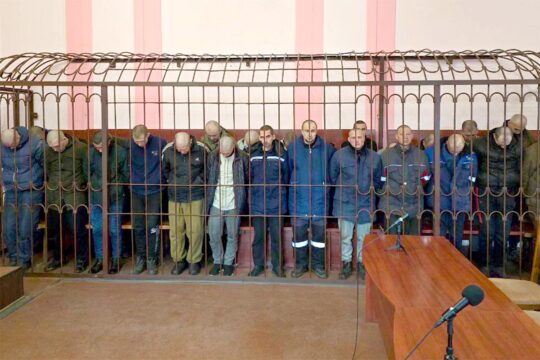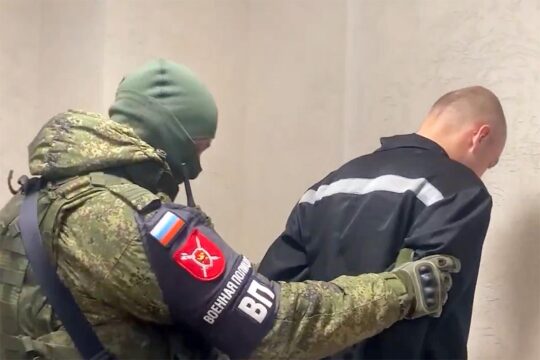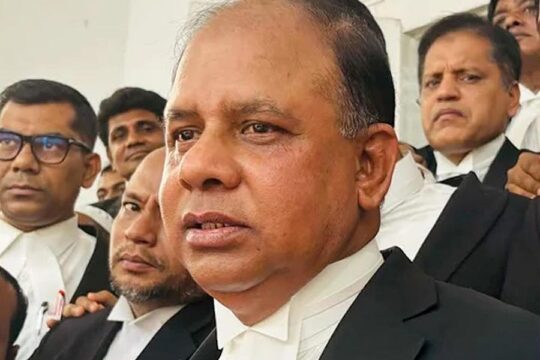“At barely nine o’clock, a young woman on a bicycle passed by the address Chernomorskaya 17, opposite the polling station, in Mariupol. She threw out a package with unknown contents and left immediately. I thought she had thrown garbage in an inappropriate place. However, upon visual inspection, it was determined that the package, the belongings, a T-shirt with a giraffe print, contained a device resembling an explosive,” Dmitry Kitaygora, the deputy chief of the criminal police of the Primorsky district of Russian occupied Mariupol, Eastern Ukraine, shared with Donetsk investigators in the autumn of 2022. On September 27, 2022, he was “on duty” near the Mariupol district administration building, where the so-called referendum on the Donetsk People’s Republic’s (DNR) inclusion into Russia was taking place.
According to the Russian investigation, the girl who threw the package turned out to be a 26-year-old Ukrainian, Irina Navalnaya, born in Mariupol and graduated from the Pryazovskyi State Technical University there. Four months after the start of the Russian invasion, in May 2022, Navalnaya left the occupied Mariupol and was evacuated to the Ukrainian city of Berdichev, in Zhytomyr region. The girl’s mother, Alexandra Skachko, who also left Mariupol, said that officers of the Russian intelligence services, the Federal security service (FSB), who were checking out departing Ukrainians, mistreated Navalnaya because of her surname: the young woman shares the same last name as the Russian opposition leader Alexei Navalny, who died in prison in February 2024.
“Do as we say”
In August 2022, Irina Navalnaya traveled back from Berdichev to the occupied Mariupol to visit her grandmother. In late September, Russian state media reported that Navalnaya had been detained for attempting to commit a terrorist act. Later, the RIA Novosti agency published a recording in which the young woman answers questions asked by two unknown men.
In the video, Navalnaya recounts that at the border of Zaporizhzhia region, a man, who did not identify himself and was dressed in civilian clothes, forced her off the bus and said: “Either you don’t go, or you do as we say.” Later she received instructions from him to retrieve an explosive device from a private house in the Mariupol suburb of Novosyolivka and bring it to the administration building of the Primorsky district on the day of the referendum. Following his instructions, which Navalnaya hesitantly recalls, she was supposed to return home for the remote control, then come back to the administration building and press a button. It was at this moment, according to the investigation, that she was stopped by police officers.
- “Did you realize that people could die because of your actions?,” asks one of the two men who are off-screen in the video.
- “Yes,” Navalnaya responds.
- “And nothing was stopping you?”
- “I have issues with empathy.”
- “With what?”
- “She doesn’t like people,” intervenes the second man, who had not talked on the video yet.
- “I don’t dislike people, I’m just not very good with their emotions,” Navalnaya clarifies.
- “Basically, she doesn’t like people,” the man continues on her behalf.
“Scared and covered with bruises”
“I have never seen her with such a look in her eyes before,” the girl’s mother said later as she was describing the video. “It is not just fear, her cheeks were red. Apparently, they also beat her, but we can only see her face. They brought her to her grandmother's place that same evening in handcuffs with a search warrant,” said Skachko who lives in Ukraine.
For a year, the young woman was kept in DNR, at the Donetsk pre-trial detention center. In January 2023, Olga Romanova, a Russian human rights activist and the founder of the foundation “Russia Behind Bars”, wrote that Navalnaya had been beaten up in the detention center. Referring to released Ukrainian prisoners, Romanova wrote that Navalnaya had spent a month in a cell with “regular prisoners” who were supposed to “teach her the rules of the prison.” Then she was transferred back to the cell with Ukrainian prisoners of war, who saw her “scared and covered in bruises.” “She said they beat her during interrogations, and the guards beat her too,” Romanova added in her report.
Transfered to Rostov-on-Don
In the fall of 2023, Navalnaya’s case was referred for consideration to the Southern District Military Court in Rostov-on-Don, in Russia, where the young woman herself was transferred. The first hearing took place in November 2023. The defendant stated that she did not admit her guilt.
Since then, there have been five hearings in Rostov-on-Don, with the next one scheduled for May 16. During one of the hearings, the court questioned two key witnesses, whose testimonies form the basis of the criminal case against Navalnaya. They answered questions in a hearing via videoconference from the Donetsk Garrison Military Court.
One of the witnesses is a 50-year-old taxi driver named Alexander Panyushkin. On the day of the referendum, he went to work as a driver at one of the polling stations. In court, he recounted seeing Navalnaya twice on September 27. First, at around 7 a.m., she rode a bicycle towards the sea, and later she walked back on foot. During that time, the taxi driver was sitting in a tinted car. She was pushing the bicycle next to her, and according to Panyushkin, there was a bag hanging on its handle. The girl threw it into the bushes. The taxi driver reported the incident to a police officer on duty near the polling station, and then participated in the search for the bag. Based on Panyushkin’s testimony, there was about 15 meters between him and the bushes. But Ivan Bondarenko, the lawyer representing Navalnaya, doubts it was possible for him to see the thrown package: “From the described landscape, he could not have seen someone throwing a package into the bushes.”
“I didn’t see the girl myself”
The second witness is 48-year-old Dmitry Kitaygora, the current deputy chief of criminal investigations at the Primorsky District Police Department in Mariupol. Back then, on September 27, 2022, he was in uniform, on duty, patrolling the streets near the district administration. During the investigation, he claimed that he personally saw Navalnaya throw the package. However, in court, it turned out that he was informed about it by the taxi driver: “I was told that the girl passed by and threw away garbage; I didn’t see the girl myself,” he said at the hearing, answering to questions asked by the defense.
“When the investigation was taking place, all the witnesses claimed to be eyewitnesses to the crime. However, during the court hearing, it turned out that this was not the case,” said Navalnaya’s lawyer. Additionally, according to Kitaygora’s testimony in court, on September 27, he was only five to seven meters away from the spot where the accused threw the package. Bondarenko doubts that, once his client had seen a person in uniform, she would have decided to throw explosives in front of them and calmly walk away. The defense will present his detailed position on the case after all the evidence is provided by the prosecution. At the moment, they are analyzing the evidence, Bondarenko told Justice Info.
No exchanges of civilians prisoners?
According to the Ministry for Reintegration of Temporarily Occupied Territories of Ukraine, as of November 2023, there were 4,337 Ukrainians in Russian captivity. Of these, 3,574 were military and 763 were civilians.
There is no specific algorithm in international law on how to release civilians from captivity. According to the Geneva Conventions, only combattants made prisoners of war can be exchanged with each other, and civilians can only be recognized as prisoners of war if they participate in the conflict and accompany armed forces.
Despite this, civilians are still periodically included in exchanges. For example, on January 3, 2024, an exchange of prisoners of war between Russia and Ukraine, the first since August 2023, took place: 248 people returned to Russia, and 230 people to Ukraine. And when commenting this prisoner exchange, Ukrainian President Volodymyr Zelensky wrote: “Ours came home. More than 200 of our soldiers and civilians have been returned from Russian captivity.” However, how often and in what numbers civilians end up on the exchange lists is unknown.
During winter 2023-2024, Navalnaya, along with a dozen other Ukrainian prisoners of war, was planned to be exchanged. At the end of December, they were transported from the investigative isolators of the detention center in Rostov to Donetsk. The absence of detainees in Rostov-on-Don can explain the lengthy pauses in the consideration of many similar cases by the Southern District Military Court in the city. However, the exchange of Navalnaya and other Ukrainian prisoners of war whose cases are pending in Russian courts did not happen.
Evgeny Smirnov, a lawyer from the Russian human rights group “First Department”, specialized in cases of treason, espionage and extremism, believes that the main factor in the matter of exchanging civilians is political will: “If decision-makers in high offices decide on an exchange, then there is always a legal way to implement it.” According to the lawyer, “people are often released by presidential decree of pardon, which is not possible during the active phase of the case. Release during the investigation and trial stages is legally possible only through a change in the measure of restraint.” However, according to Smirnov’s observations, since February 2022, there have been no exchanges involving civilians facing criminal charges in Russia.







